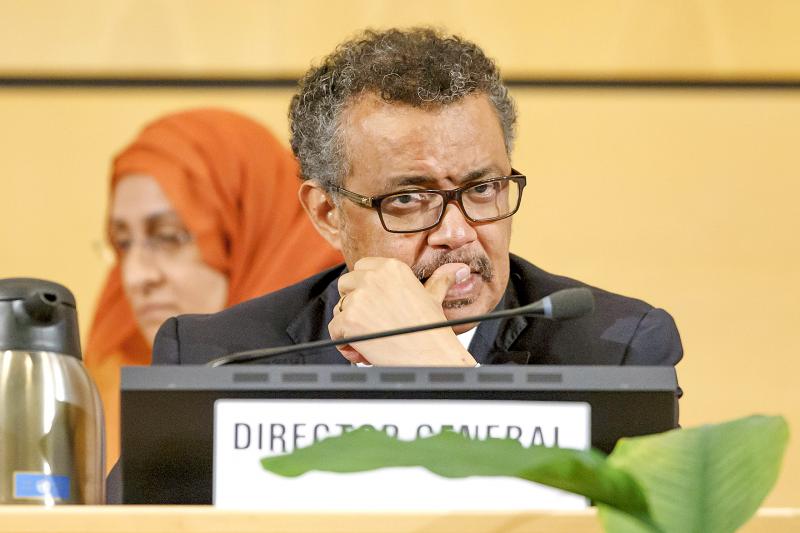Whether Taiwan would be invited to attend this year’s World Health Assembly (WHA) depends on a power play within the WHO, despite open support from like-minded countries, Taiwanese observers have said.
The WHA, the decisionmaking body of the WHO, is to hold its 73rd session from May 17 to 21 in Geneva, Switzerland, although the meeting might be conducted virtually due to travel restrictions caused by the COVID-19 pandemic.
US-based magazine Foreign Policy reported that Washington is seeking the support of key allies to help restore Taiwan’s observer status at the WHA and to cosign a letter asking WHO Director-General Tedros Adhanom Ghebreyesus to invite Taiwan to the assembly.

Photo: AP
The WHO Secretariat has the discretion to invite any non-WHO member to the WHA without calling a meeting to vote on the matter.
Democratic Progressive Party Legislator Lo Chih-cheng (羅致政) on Saturday said that the key for Taiwan’s bid to attend the WHA rests on the internal politics of the WHO, despite growing international support for the nation.
“Taiwan will have a better chance of being invited to the WHA if the US increases its maneuvering in the WHO Secretariat,” he said.
Prospect Foundation president Lai I-chung (賴怡忠) said that Tedros is extremely unlikely to invite Taiwan to the WHA, after the Ethiopian microbiologist on April 8 accused the nation of organizing personal and racist attacks against him.
However, the US might want to break the unspoken rule that Taiwan’s participation requires China’s approval, he added.
Lee Che-chuan (李哲全), a senior researcher at the Institute for National Defense and Security Research, said it is difficult for Taiwan to be accepted into the WHO due to “one China” policies observed by many nations, but added that there is a chance that it could be invited to the WHA.
The Republic of China was a founding member of the WHO. However, the nation was expelled in 1972, a few months after its seat at the UN was taken over by the People’s Republic of China.
Since then, Taipei has been unable to participate in the WHA, apart from the observer status it held from 2009 to 2016, when relations with Beijing were relatively warm under the Chinese Nationalist Party (KMT) government.

The disruption of 941 flights in and out of Taiwan due to China’s large-scale military exercises was no accident, but rather the result of a “quasi-blockade” used to simulate creating the air and sea routes needed for an amphibious landing, a military expert said. The disruptions occurred on Tuesday and lasted about 10 hours as China conducted live-fire drills in the Taiwan Strait. The Civil Aviation Administration (CAA) said the exercises affected 857 international flights and 84 domestic flights, affecting more than 100,000 travelers. Su Tzu-yun (蘇紫雲), a research fellow at the government-sponsored Institute for National Defense and Security Research, said the air

Taiwan is to commence mass production of the Tien Kung (天弓, “Sky Bow”) III, IV and V missiles by the second quarter of this year if the legislature approves the government’s NT$1.25 trillion (US$39.78 billion) special defense budget, an official said yesterday. Commenting on condition of anonymity, a defense official with knowledge of the matter said that the advanced systems are expected to provide crucial capabilities against ballistic and cruise missiles for the proposed “T-Dome,” an advanced, multi-layered air defense network. The Tien Kung III is an air defense missile with a maximum interception altitude of 35km. The Tien Kung IV and V

Trips for more than 100,000 international and domestic air travelers could be disrupted as China launches a military exercise around Taiwan today, Taiwan’s Civil Aviation Administration (CAA) said yesterday. The exercise could affect nearly 900 flights scheduled to enter the Taipei Flight Information Region (FIR) during the exercise window, it added. A notice issued by the Chinese Civil Aviation Administration showed there would be seven temporary zones around the Taiwan Strait which would be used for live-fire exercises, lasting from 8am to 6pm today. All aircraft are prohibited from entering during exercise, it says. Taipei FIR has 14 international air routes and

Taiwan lacks effective and cost-efficient armaments to intercept rockets, making the planned “T-Dome” interception system necessary, two experts said on Tuesday. The concerns were raised after China’s military fired two waves of rockets during live-fire drills around Taiwan on Tuesday, part of two-day exercises code-named “Justice Mission 2025.” The first wave involved 17 rockets launched at 9am from Pingtan in China’s Fujian Province, according to Lieutenant General Hsieh Jih-sheng (謝日升) of the Office of the Deputy Chief of the General Staff for Intelligence at the Ministry of National Defense. Those rockets landed 70 nautical miles (129.6km) northeast of Keelung without flying over Taiwan,